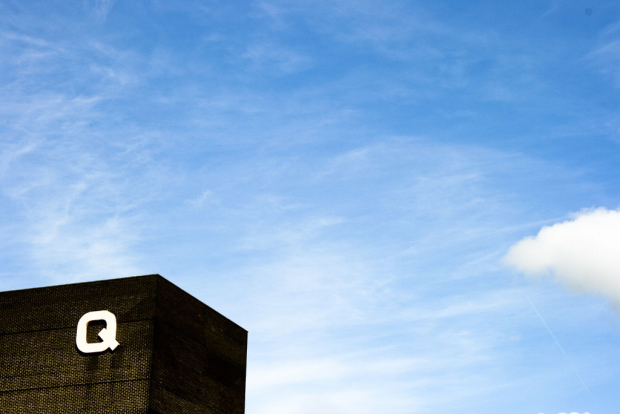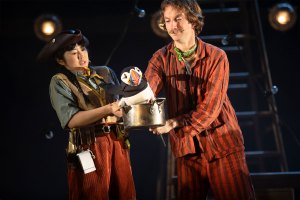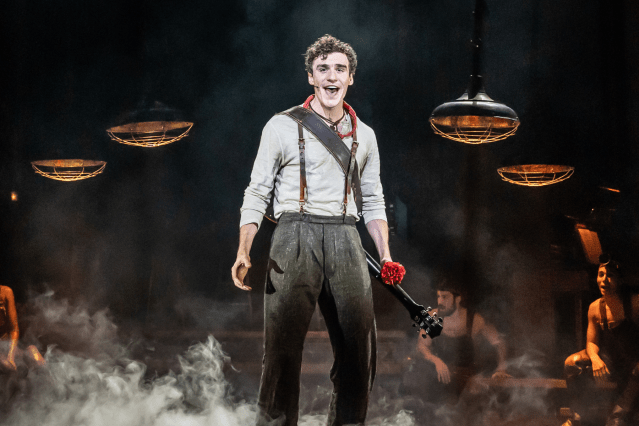Michael Coveney: First-time theatre experience marks you for life
WhatsOnStage critic Michael Coveney on the power of the first time

© Nico Hogg
There’s a brazen invitation currently stuck to the front doors of the Royal Court in Sloane Square: "COME IN" it proclaims in typical contemporary terms of inclusivity and access to all. Theatre remains a no-go area for most people partly because of ticket prices, but mainly because of cultural cringe; theatre is not something for everyone, so it’s almost certainly not for us. It reeks of something "other."
Unfashionably, that’s what I like about theatre: its mystery, its strangeness, its insistence on transporting you to distant worlds – as long as your passport is in order and your curiosity intact. And the more the theatre itself insists that all theatrical activity takes place on a level playing field and mirrors exactly what they think you should be concerned about and should agree with, the more my critical hackles rise.
Going to the theatre was always, for me, an accidental process of breaking and entering, not a social studies course or a politically correct brainwash. I thought about this at the Queen’s, Hornchurch the other night where incoming artistic director Douglas Rintoul kicked off with a serviceable, thoroughly enjoyable Much Ado About Nothing. It’s a popular show. It’s not theatre for eggheads, or even critics, really. And it’s always been like that at the Queen’s.
At the Queen’s there was a sense of community without any strain or social engineering
The current building opened in 1975, but my first theatre visits (growing up in Ilford) were to the old Queen’s, a crumbling, converted cinema on Station Lane, as well as to Joan Littlewood‘s Theatre Workshop at Stratford East.
At the Queen’s I saw the early work of Nigel Hawthorne and Glenda Jackson (before she fetched up at the RSC), an early rep re-tread of Beyond the Fringe and Donald Sinden‘s younger brother, Leon, playing the lead in a brilliantly (but cheaply) designed Macbeth, which I was studying for O-levels. And at Stratford East I saw plays of Alun Owen, Brendan Behan, and productions by Joan Littlewood. As at the Queen’s, the audience was mixed, alive, even raucous (at Stratford, certainly) and there was a sense of community without any strain or social engineering. Piety, or the popular mantras of today such as "this stuff’s good for you" or "it’s about Syrian refugees and therefore important" were nowhere in evidence.
My first show "up West" was the D’Oyly Carte in The Gondoliers at the Savoy, to which my father had taken my brother and I because we had joined the World Record Club and received a vinyl disc of that show in one of the batches; and my first "straight" play was Paul Scofield in A Man For All Seasons at the Globe (now the Gielgud) which we were taken to as Thomas More was a great Catholic saint and we were Catholics.
The forbidden, delicious side of theatre began when I started infiltrating (without parental supervision) the RSC at the Aldwych, the Royal Court and the National at the Old Vic in the early 1960s. A few years in, I saw Vanessa Redgrave as Nina in The Seagull at the Queen’s (the cast also included Peter Finch, Peggy Ashcroft, George Devine and Peter McEnery); that was a Court production, directed by Tony Richardson, playing in repertory – imagine it today! – with Brecht’s Saint Joan of the Stockyards. It was amazing, mind-blowing. The actors were very good – and they were famous.
And Redgrave’s performance came flooding back to me when I saw her, now aged 79, last Friday night fill the Olivier auditorium with an impassioned reading of Wilfred Owen’s Strange Meeting; this was part of an NT Platform to celebrate the publication of Poems that make Grown Women Cry, edited by Anthony and (his son) Ben Holden, in association with Amnesty International. Other onstage poem-choosers and readers – it’s a tremendous book, by the way – were Edna O’Brien, Maureen Lipman, Mariella Frostrup, Juliet Stevenson and Jude Kelly.
As I watched Redgrave I pondered the news that she is to play Queen Margaret to Ralph Fiennes‘s Richard III at the Almeida in June (following their electrifying mother and son turn in Fiennes’s film of Coriolanus) and the prospect of another young generation of new theatre-goers having their lives changed for ever by the experience of seeing great acting for the first time on a stage. I envy them their good luck.












